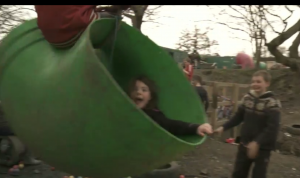Play = Learning
 We are born playing. As babies, we pick up and drop cups to learn about gravity. We play ‘house’ to explore social relationships and status dynamics. We roughhouse and play pranks to explore physical limitations and emotional impacts. Play is a quintessential tool for learning.
We are born playing. As babies, we pick up and drop cups to learn about gravity. We play ‘house’ to explore social relationships and status dynamics. We roughhouse and play pranks to explore physical limitations and emotional impacts. Play is a quintessential tool for learning.
So why do we find it so hard to play as adults?
Filmmaker Erin Davis, in an interview with The Atlantic about her documentation of a cutting-edge adventure playground in Wales called “The Land”:
At the organizational level, we might not be inclined to climb on discarded waste and build fires in the backyard, but we do want to promote learning, and we can do this by promoting play. A learning, playing organization is adaptive, flexible, and can lead the way for others. Strategically, the organization that plays has a huge competitive advantage both in terms of knowledge, and in company culture, mental & physical health, and employee retention.
A few things you might consider: Where are you making time for play in your life/in your organization? How might you support others learning and growth through play (and make your group that much smarter because of it)? What rules and norms are you willing to challenge in order to advance your learning and give your organization a competitive edge?
As my art teacher used to say, “If you don’t take risks, you don’t get gifts.”
Now, please, go out and play.